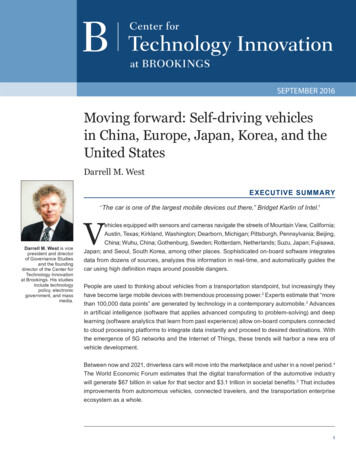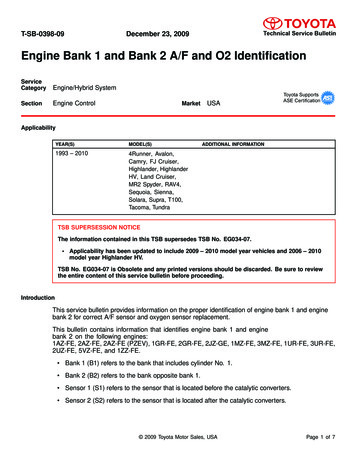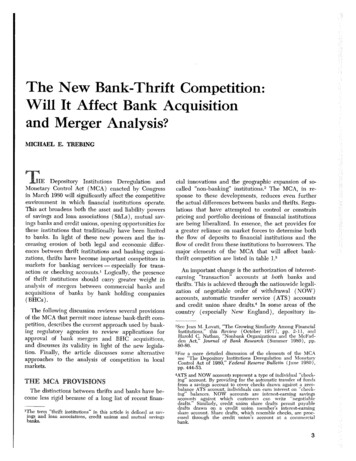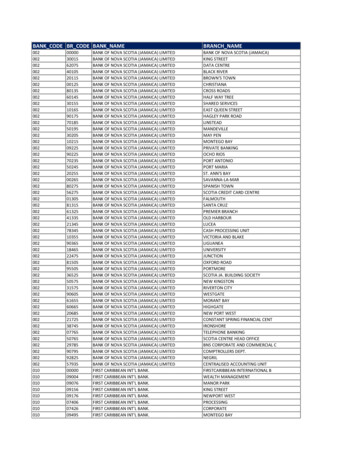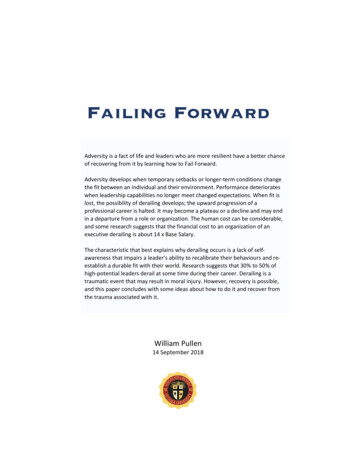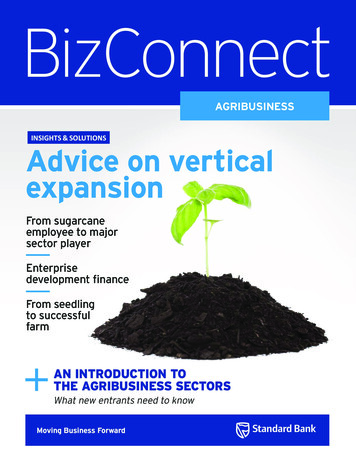
Transcription
Cash flowAGRIBUSINESSsolutions from the2015Moving Business Forwardfarm to the abattoir14Contents 6From seedling to successful farmVenturing into farming? Standard Bank’s Nico Groenewaldgives must-know advice on common start-up mistakesand how to prepare your agribusiness for farming success.Now let’s talk AgriBusiness.8 Exploit the full value chainDiversification and integration are vital to long-termsustainability and prosperity.Our AgriBusiness teams are not only bankers, but alsoagricultural experts of this dynamic sector. We’ll giveyou access to working capital, and the flexibility youneed to operate your business. This is the reason morebusinesses bank with Standard Bank than any otherbank in South Africa. For more information,visit www.standardbank.co.za/businessAuthorised financial services and registered credit provider (NCRCP15).2BizConnect www.standardbank.co.za/bizconnectThe Standard Bank of SouthAfrica Limited (Reg.No. 1962/000738/06). SBSA 173803. 10/14Moving Forward is a trademark of The Standard Bank of South Africa Limited.11 Considerations for vertical expansionExpert advice on exploring the complexities ofunchartered territories.12 Are you adequately covered?Your agribusiness may have insurance, but are youMoving ForwardTMadequately covered? Bryan Verpoort walks you throughthe lesser known facts of your risk insurance.14 From sugarcane employee to majorsector playerKZN cane-cutting business set to grow turnover byR10 million per annum owing to industry experience,business knowledge and reliable financial support.16 Enterprise DevelopmentUnpacking Standard Bank’s ED offering.18 Agribusiness sub-sectors introductionAn overview of the sector looking at opportunities andthreats for new entrants.www.standardbank.co.za/bizconnect BizConnect3
Moving ForwardTaking agribusiness forwardANico GroenewaldHead of AgribusinessStandard BankABOUT BIZCONNECTBizConnect is a leading onlinebusiness portal. Developedspecifically to supportentrepreneurs and small andmedium-enterprise owners inSouth Africa, BizConnect givesyou access to relevant, practicaladvice and information on howto start, manage and grow your business. Discover the latestnews and trends relevant to a number of business sectors,including commercial real estate, agriculture, franchising,manufacturing and retail.Visit: www.standardbank.co.za/bizconnect4BizConnect www.standardbank.co.za/bizconnectCONNECT WITH USCall:0860 123 000 27 11 299 4701Email:information@standardbank.co.zaFacebook: StandardBankSATwitter:@SB BizConnectgriculture has been theone sector that maintainedmomentum last year,providing essential supportto the overall economyduring some difficult times. This waspossible partly because the industry wasproactive in working with governmentand other stakeholders to resolve issuesaround labour, which resulted in thelabour unrest of 2013 not repeatingitself in 2014.The industry also demonstrated itswillingness to help find a sustainable wayforward for land ownership. Keeping asteady hand on two such fundamentalinfluences on agricultural viability helpedboost productivity and, therefore, theindustry’s competitiveness. However,we must ensure this year that we jointlyreach some definitive conclusions that willenable the industry to grow strongly and,thereby, become an employer and a careerof choice. Taken together, these factors willgive South Africa greater food security.Working togetherAchieving this will mean taking a holisticview of agriculture rather than seeing it asa collection of different industries, eachwith its own interests. It will also meanthat agriculture must continue its trendtowards being highly organised so as tomore effectively protect and promote theinterests of its members.For example, Grain SA has beenproactive in establishing new markets andfacilitating the affordability of inputs andthe profitability of product sales on behalfof farmers. Examples like these reinforcethe need for efficiency at all levels ofagriculture, not just on the farm.One of the urgent efficiency issueswe need to address, as an organised andprogressive sector, is water usage. As thecountry’s largest consumer of water, thereis much more we can do to ensure thatwe use only the amount that is essentialfor production.2015 will be no different from otheryears, in terms of the impact on the localindustry of dynamic factors such as theinternational price of food and inputs,fluctuations in the exchange rate, andunpredictable weather patterns.Remember the basicsFarming is a long-term venture. There areno quick wins. Therefore, regardless of thecurrent trends, the best way to stay viableremains the same. Manage the farm asthough it is a business. Understand yourcosts and your markets. Plan ahead indetail. Make provision, through your owninvestment or insurance, for risks. Andhedge at least one third of your productprices so that you are confident of thatincome, while remaining free to capitaliseon end-of-season price increases.With these basics in place there isno reason why 2015 should not be agood year. Nicowww.standardbank.co.za/bizconnect BizConnect5
InsightsFrom seedlingto successful farmVenturing into farming? Standard Bank’s Nico Groenewaldgives must-know advice on common start-up mistakes andhow to prepare your agribusiness for farming success.Farming takes time and patiencebefore you will reap the rewardsof your agribusiness and if you’rea new entrant you must beprepared to invest for the longrun. This will mean proper planning forthe opportunities and challenges that youmight face to ensure your first sale will bea success.GETTING GOINGHere’s what you will need to know to fundyour agribusiness and mitigate the risksand challenges that you may encounter.Finding the right fundingThere are different types offarming entrants into the market. Someentrants might have a full-time job butrun a farming operation on the side toimprove or change their lifestyle. In thisinstance, there are cash flow streams intothe agribusiness from their salaries andthese kinds of entrants tend to fund theirstart-ups themselves.Other entrants may have a passion forfarming but have little capital to get thebusiness off the ground. Because of thefinancial risk that is associated with theproduction of any agricultural product,16it may be a challenge to get financing tofund the operation.Because these entrants have littlecollateral, the bank may not be able tofund them. Instead, new entrants shouldlook at co-funding through an institutionthat has a development mandate, suchas the IDC or the Landbank, which canprovide some start-up capital. Newentrants should also look at entering amentorship programme to assist them ingrowing their agribusiness.2Surmounting thebarriers to entryCapitalThere are several barriers to entryin agriculture and one of the biggestbarriers for new entrants is access tocapital. Agribusinesses can mitigatethis risk by considering joint venturesor joining forces with input suppliers toensure that some of the production riskis isolated. By establishing partnershipswith the offtakers of products, farmerswill also have buyers for their products atspecific prices.Standard Bank has establishedrelationships with input suppliers andBizConnect www.standardbank.co.za/bizconnectcan assist newer entrants in receivingsupport by introducing them to theright parties. In this way, Standard Bankcan assist with financing of the cropproduction while managing the riskswhen assisting an entrant who does nothave production history.LandTraditionally, land has been linked toowning a title deed and this title hadto be presented to the financier, whichwas used as collateral to provide input.However, now there may not be a title,which has changed the risk model for thebank, who can no longer look to the landas collateral.In South Africa, we have communallands that do not belong to any specificindividuals and the bank needs toclearly understand the flow of fundsand product before we will be able tooffer funding. The process of receivingfunding will take a bit longer in theseinstances, as it does not fit into thetraditional model of funding where landis used as collateral.Standard Bank works with therespective agri-industry bodies thathave various programmes for entry levelfarmers which guide them through theprocess. Once these newer farmers havereached a certain level where they haveproven that they can produce successfullyon a commercial basis, the bank can thenassist with financing.3Three actions for farmingsuccessThe cycle of the productThe biggest mistake that start-ups tend tomake is failing to understand the cycle ofthe product that you are working with andthe production risk associated with this issignificant. Farming in practice is entirelydifferent to reading about it in theory.It takes a deep understanding of howto balance all the variables involved infarming to produce a successful product.Maize, for example, can only beplanted within a certain window period,but the soil needs to be at the correctmoisture level and the temperaturesneed to be right. When planting your firstmaize crop you might not have factoredin all the variables, which could result intotal crop failure.This is why it is so important to have amentor who can help you to understandall aspects that are involved in the cycleof the product and how to avoid thesecommon pitfalls.Price increasesEntrants must understand the marketand the price trends in that marketexceptionally well. Farmers aretraditionally price takers, so they areexposed to what happens in the market,which is why they need to protectthemselves, such as hedging the priceso that they are not exposed to thedownside of that price.Financial planningThe need for proper financial analysisand planning is commonly overlooked;however this is an essential tool formanaging your business. It’s critical foragribusiness owners to understand theircash flow and, if there are deviations,how these should be dealt with. TOPADVICEFor newentrants, itis of criticalimportanceto have amentor whocan help youto understandall aspects thatare involvedin the cycle ofthe productand how toavoid commonpitfalls.www.standardbank.co.za/bizconnect BizConnect7
Value ChainBuild your wealthby exploiting thefull value chainDiversification and integration are vital to long-termsustainability and prosperity. BY NICO GROENEWALDBy participating in the extendedagricultural value chain, farmerscan improve their profitability.This includes looking to diversifyproduct ranges, as well asexploring the integration of up anddownstream activities as an ideal routeto sustainability for individual agriculturaloperations. THE POWER OF DIVERSIFICATIONIt’s essential for farmers to move awayfrom putting all their effort into one or twomain crops and, instead, have a range ofcrops to spread their risk, increase revenuestreams, enable more environmentallypositive activities, and intensify theproductivity of existing resources.Market tastes shift frequently, so it’svital that farmers become more agilein their operations. Sustainability in themodern era is utterly dependent onadaptability.Bosveld Sitrus, South Africa’s largestcitrus producer and exporter, is a primeexample of diversification, currentlyexporting 5.5 million cartons of fruit to51 countries annually, with an additionaloutput of non-citrus produce of80 000 tons. It’s a business that clearlydemonstrates that diversifying within thevalue chain enables you to spread existingresources over more output, reducingoperating costs and increasing margins.You can do more with less. High efficiency, high growthManagement at Bosveld Sitrus takea holistic view of all its operations,integrating environmentally positivepractices into both strategic andtactical activities. Energy efficient equipment is used.Water usage, soil conditions, andcultivars are closely scrutinised onevery area of each farm.8BizConnect www.standardbank.co.za/bizconnect Planting decisions are made accordingto the suitability of a given crop fora given set of environmental factors,ensuring that yields are optimised inall cases.Where land is not suitable for fruittrees or vegetables, it’s used forgrazing cattle or allocated to gamefarming.Organic fertilisers are used whereverpossible. Waterways are built tooptimise both rainfall and irrigation,most of which is done throughprecision technology. The introductionof new varieties of fruit trees isdone as part of the cyclical 30-yearreplacement of older trees; ensuringthat orchard yield remains highand that products remain modernand relevant to changing marketpreferences.As a result of these strategies,the Group’s yield across all productsconsistently matches or outperformsindustry averages.Piet Smit, CEO of Bosveld GroupHoldings knows that if you take careof the detail and plan using as muchdata as possible, you can reduce youroperational and financial risk extremelyeffectively and manage to innovate on acontinuous basis.INTEGRATING ALONGTHE VALUE CHAINParticipating in the full agricultural valuechain can bring exponential returns.Simply put, the need for a businessapproach to farming is more importantthan ever.Farmers producing at commerciallyviable levels are inevitably confrontedwith the need to make decisions aboutexpanding beyond the farm gate into theA LOOK AT BOSVELD SITRUSBosveld Sitrus is a holding companyfor 10 operations, mostly based inMpumalanga and Limpopo, covering3 730 hectares, and all focused onexporting 5.5 million cartons of fruit,predominantly citrus, to 51 countriesaround the world annually. It alsoproduces bananas, avocados, litchis,mangoes, sugarcane, potatoes, beansand butternut for the local market.Total annual output for produce otherPiet Smitthan citrus exceeds 80 000 tons.In addition, the company has interests in secondary sectors, such as processingand carton manufacture.Group companies include a nursery, where new trees are cultivated for thevarious farms, packing facilities that enables the group to
Price increases Entrants must understand the market and the price trends in that market exceptionally well. Farmers are traditionally price takers, so they are exposed to what happens in the market, which is why they need to protect themselves, such as hedging the price so that they are not exposed to the downside of that price. Financial planning
